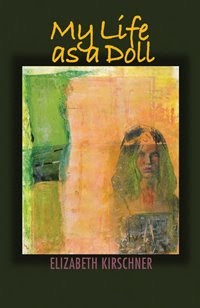
My Life as a Doll
by Elizabeth Kirschner
Autumn House Press
ISBN 978-1-932870-20-6 $14.95
www.autumnhouse.org
A review by Mignon Ariel King
If you are going through a rough time, don’t read this collection. Separated into four parts, each serving as a eulogy to the lost periods of the poet’s life, this is excruciating stuff. Cuckoo recounts in brutal detail the childhood head injury inflicted by the narrator’s mother via a baseball bat; and if you ever wondered what it feels like to lose one’s mind and know it, you will find out. The traumatized adult narrator’s words punish the reader as well as the now-deceased abusive mother. Keep reading anyhow, for although the story never gets better—that is, expect no pretty made-it-through-the-storm ending—the language can be magnificent: “Whatever emerges at season’s end/comes from a harrowing heaven…”(3).
By page six the narrator has disappeared into the basement to hide. In her addled brain, there she is ostracized from a community of dolls. Do not expect her to lead you out of the dark. She does not want to leave as: “[s]alvation was a hardship/I was not yet ready to bear”(6). The concepts of forgiveness and moving on are not part of this narrative.
The adult narrator obsessively fantasizes about confronting her mother with tears that are
“glass splinters.//Let them slice, slice, slice/her dead tongue…”(7). The contradictions that once swirled through her mind were supported by the mixed messages of the only women around her, her mother and nuns. Pages fourteen through fifteen gave me goosebumps—the good kind. One of the narrator’s purely vulnerable moments occurs
when she explains how she tried to appease her mother:
“I hid Dixie cups full of violets
in the kitchen cupboard
for her to find and penny candy tucked
into the mailbox with the mail…”(14).
Despite her anger toward nuns, the narrator constantly calls out to God, asks what keeps him too busy to save her, talks of drowning in demons. The narrator is casually cuckoo at times, like a broken talking doll stringing disjointed phrases together, yet her dark humor does not inspire the reader to sing along to the Itty Bitty Ditty that is the second section. This section could easily be renamed Itty Bitty Deaths, with sexual allusions intended. The alcoholic young adult narrator gets bogged down in too much imagery here, the result of which is that a shift on page thirty-four begins a style that sometimes smacks of flat and ordinary prose. There is death, bird, and burning imagery, but it is combined with so much cutesy nursery rhyme that the poet appears to have yielded to the
child narrator for the first time in the narrative. This appears badly-timed and could easily inspire the old “is this art or mere therapy?” debates.
If the lack of transition to Tra-la-la makes sense to you, my hat is off. Ditto for the recurring “dust baby.” Understandably, the narrator, now wife and mother of a charming 11-year-old son, has had a complete psychotic breakdown by this point, and has better things to do than keep the reader up to speed, but still…. Now, however, come brilliant, snarky lines to describe her talk therapy: “I was a talking tree/and my leaves were on fire”(43). The description of inpatient mental health care is hilarious. Try not to laugh at: “our twitchy fingers/and even twitchier minds/needed something to do”(48). Also in this section is one of the few safe places for the reader to land as the narrator falls in love with her own madness—her compassion for her son.
The final section O Healing Go Deep is mostly as melodramatic as it sounds. Yes, it seems cruel to label the deeply disturbed “melodramatic,” but Kirschner pulls no punches, nor will this reviewer. Perhaps the first section, the weakest poetry in the book, could be summed up by three phrases from the fourth: “Why oh why did she/thunder my head with the bat”(59)? “[I] turned into a mannequin/in rigor mortis”(59). “Can the living/divorce the dead? Hell’s bells, it’s time”(61). This collection is a must read for anyone going through an okay time yet feeling haunted by parental imperfections and childhood memories. Read it. Then call your mother.


































No comments:
Post a Comment